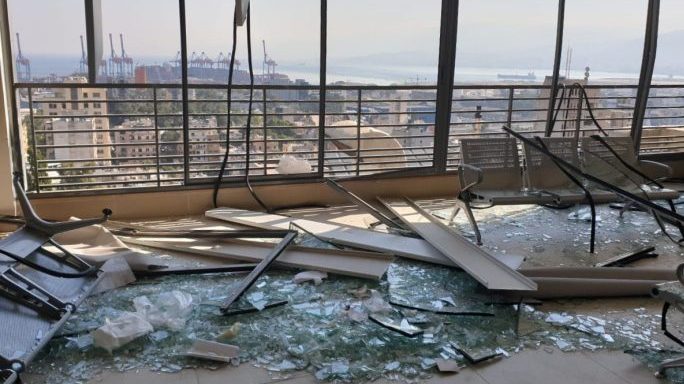A year ago, when a massive explosion at a warehouse obliterated much of the bustling port of Beirut, the eyes of the world were fixed on Lebanon and the vast human, structural, and economic devastation that had been caused.
In truth, however, Lebanon’s problems began well before the Aug. 4, 2020, port explosion, which has only exacerbated a social and economic crisis pushing the country to the point of collapse.
Some, including Lebanese Father Abdo Raad, believe the roots of crisis Lebanon is facing run so deep, that the only possible solution is to completely replace the entire political class.
Speaking to Crux, Raad placed much of the blame on corrupt political elites, saying the only solution he sees is for these leaders to “leave the country, and they must return money to the country. This is the solution.”
“If they don’t give back to the country the money they stole, if they don’t leave governing to other people who are less corrupt, because corruption has unfortunately become a big problem, then it won’t be resolved,” he said.
Last year on Aug. 4, more than 200 people were killed and at least 4,000 injured in one of the world’s most serious industrial accidents after a massive explosion rocked the port of Beirut. The entire city shook from the impact of the blast, and numerous videos taken showed a large mushroom cloud rising and spreading over the port area. Countless homes and businesses were either damaged or destroyed.
The explosion was caused by some 2,750 tons of ammonium nitrate which had been stored unsafely inside of a warehouse. The chemical is frequently used as a fertilizer.
Lebanon’s government resigned in the days following the blast, however, the country’s leaders for the past year have been in a deadlock over the formation of a new one, unable to agree on a composition largely due to sectarian divisions.
Meanwhile, Lebanese currency has been in a landslide, losing roughly 90 percent of its value while around 77 percent of households can no longer afford basic food items. Citizens now spend hours in line at gas stations to buy fuel, and many suffer with power outages lasting up to 22 hours a day, as well as medical shortages.
European nations such as France have promised billions of dollars in aid pending certain structural reforms, as well as guaranteed transparency in all spending. However, these demands have not been met. Last week, Lebanon’s richest man, Nijab Mikati, who was twice prime minister and a resident of its poorest city, Tripoli, was designated as the country’s prime minister and tasked with forming a new government, which his predecessors have been unable to do.
A Lebanese Greek Melkite priest currently based in Rome, Raad is founder of the Annas Linnas Association in Lebanon, dedicated to providing material assistance to the poor, refugees and the sick.
To date, he said no one has been identified as responsible for last year’s explosion, and investigations into the incident have gone nowhere. He also noted that even though a year has gone by, there has been no reconstruction of the port.
“At a judicial-political level, unfortunately even until now nothing is understood. No one has gone to the courts to be judged, and also above all, we can say that the investigations have not had a good result because the governors refuse to go to the courts,” he said, adding, “Even if they were called by some judges, they refuse under the excuse of immunity.”
Raad said he does not believe there will ever be justice for the guilty parties. “Perhaps there will be divine justice that we don’t know,” he said, lamenting the fact that the poor and starving are thrown in jail for stealing a piece of bread, “but those with responsibility, the big thieves, the governors, politicians, economists, they are always free.”
Raad said he believes corruption is at the heart of the current Lebanese crisis and is also the reason why no one has yet been identified or charged for last year’s explosion.
“What destroyed Lebanon is the corruption of its leaders,” who he argued have stolen from the people for years and are indifferent to the plight of the increasing number of their citizens living in extreme poverty.
“The biggest problem is that these leaders have also stolen hope,” he said, noting that it is not just young people who are immigrating outside of Lebanon, but well-seasoned doctors, engineers, and lawyers, have also been streaming out as the country plunges further into crisis.
While many warn a civil war might soon erupt, Raad voiced doubt that any revolution will succeed in overthrowing Lebanon’s leadership. The reason for this, he said, is sectarianism, because it is too difficult for the people to act against their confessional or leaders and come together as one unified body.
Despite the divisions that still exist in Lebanese society, Raad voiced hope that by the time the 2022 general election comes, the people will be able to elect a new political class, “but will this current political class give freedom for a free and true election, or will they use their authority and power to have a fake election the way they want it for their interests?”
Raad said his only hope to exit the situation is “a divine hope, it’s not a hope in these men, the political class, because they have done nothing, they have destroyed everything.”
“Hope comes from God, hope comes from the goodwill of the people convinced of choosing a new leading class for the country. That’s what we hope in, and we also hope that this political class allows us to hold elections,” instead of making an excuse to postpone them, he said, adding, “it wouldn’t be the first time.”

